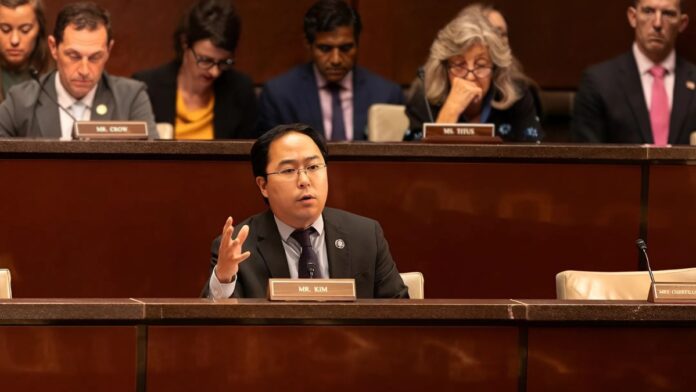The race for New Jersey’s Senate seat is in the spotlight this year, with Democrat Andy Kim and Republican Curtis Bashaw competing for a spot in the Senate.
The seat opened up after Bob Menendez resigned following his conviction on corruption charges.
Governor Phil Murphy appointed George Helmy to fill the seat temporarily, but Helmy will step down once a winner is chosen.
Next, we will take a look at who these candidates are, their debate highlights, and where they stand on important issues.
Andy Kim, who has represented New Jersey’s 3rd District for three terms, announced his run for Senate when Menendez was indicted in 2023.
He has experience in national security and often talks about working with Democrats and Republicans.
Kim’s campaign message focuses on providing stability and accountability for New Jersey.
And his opponent, Curtis Bashaw, is a hotel developer running for office for the first time.
He’s presenting himself as a moderate Republican who wants to bring new ideas to Washington.
It has to be said that right from the start of their first debate, tensions were high.
Kim criticized Bashaw for his ties to former President Donald Trump and questioned whether Bashaw truly supports abortion rights.
Bashaw, who beat a Trump-backed rival in the Republican primary, emphasized that he’s not just following the party line.
He described himself as pro-choice and highlighted his life as a married gay man.
Although both candidates support abortion rights, they have different views on what that means.
Bashaw supported the Supreme Court’s decision that overturned Roe v. Wade, but he says he respects New Jersey’s state laws that protect abortion rights.
So this led to a heated discussion between the two.
During the debate, something unexpected happened.
Bashaw stopped speaking suddenly, looking dazed, and left the stage for about 10 minutes.
When he returned, he explained that he hadn’t eaten enough and thanked everyone for their patience.
The debate continued without further interruptions, and the candidates quickly got back to the issues at hand.
Immigration then became a major topic during the debate.
Bashaw described immigration as a “crisis in New Jersey” that is costing the state money.
Kim argued that Republicans have blocked efforts to pass a bipartisan border security plan, accusing Bashaw of oversimplifying the issue.
While Bashaw pushed for stricter immigration measures, Kim talked about the need for a broader solution that addresses humanitarian concerns.
Their views on the economy also differed.
Kim highlighted his efforts in Congress to lower drug prices, like capping insulin costs at $35 per month, and to increase affordable housing.
He believes large corporations must pay more taxes to help ease the financial burden on middle-class families.
Bashaw, drawing on his business experience, called for reducing federal spending and loosening regulations to help small businesses grow.
And they both agree that many families are struggling, but they have different ideas on how to fix it.
Bashaw worked hard to show that he is not a typical Republican, which is important in New Jersey, where Democrats outnumber Republicans.
He repeatedly emphasized his support for abortion rights and LGBTQ+ issues.
In his closing remarks, he addressed New Jersey’s women and mothers, promising to be a voice for their needs.
Kim, however, kept questioning Bashaw’s political choices, especially his previous support for Trump, suggesting that Bashaw’s recent moderate stance might be more about politics than principles.
Kim’s run for the Senate has roots in his criticism of Menendez.
When Menendez faced bribery charges, Kim quickly launched his campaign, and a major potential rival, Tammy Murphy, dropped out.
Kim had challenged New Jersey’s ballot system in court, saying it favored party-backed candidates.
A judge agreed with Kim, and Murphy left the race to avoid a tough primary battle, clearing the way for Kim to secure the Democratic nomination.
For Republicans, Bashaw has been working to change the party’s image in New Jersey, where a Republican hasn’t won a Senate seat in over 50 years.
His victory in the primary showed he can appeal to Republicans looking for a fresh start.
Before running, Bashaw led local recovery efforts during the COVID-19 pandemic in Cape May and worked on economic projects statewide.
In addition to local issues, the debate touched on global topics like the conflicts in the Middle East and the war in Ukraine.
Kim stressed the importance of humanitarian aid and diplomatic efforts, while Bashaw stood firm in supporting Israel, saying the U.S. should not negotiate with terrorist groups like Hamas.
These discussions remind us that even local elections are influenced by global events.
Looking ahead, Kim and Bashaw are set for two more debates: one on October 15 with NJ Spotlight News and another on October 22 with News 12 New Jersey.
These debates are critical as they give voters more information before they head to the polls on November 5.
On that day, New Jersey will choose between continuing with a Democratic senator or trying a new direction with Bashaw.
New Jersey has a history of favoring Democratic candidates, with over 900,000 more registered Democrats than Republicans.
However, this race might be influenced by independent voters, who could swing the outcome.
Kim and Bashaw know voters care about economic stability, healthcare access, and immigration reform.
And their different approaches provide voters with a clear choice, making this election important for New Jersey and for the balance of power in the Senate.


